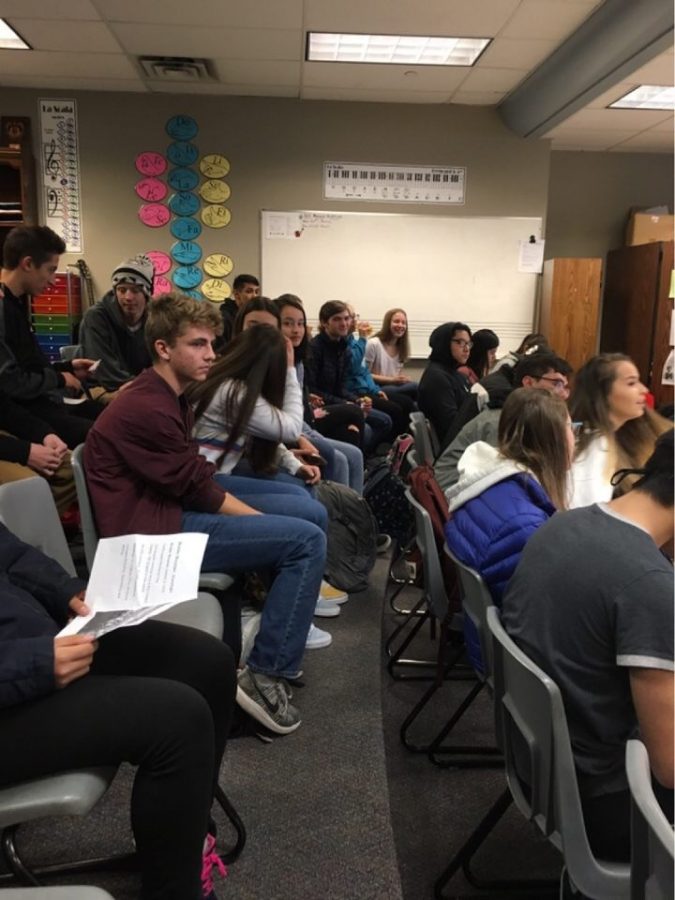Understanding Our Diversity
“Hey did you hear about the riot for Chicano’s in LA?”
“Wait, when did that happen and who are Chicano’s? I don’t ever remember that being in the news.”
We cover up events, situations, and people because we don’t want it to damage our reputation. We always want to show ourselves with eyes open. The class of Understanding Diversity, a social studies elective, provides a solution to having our eyes closed.
With our unjust world, Understanding Diversity helps to uncover the world and it’s hidden historic past. We examine the true meaning behind racism, sexism, lookism, ableism, classism, and etc. Perspectives flip as if they are sides on a dice.
Understanding Diversity pushes students boundaries. “I thought a lot more about how even little things that you do or participate in have impacts on the way other people are treated,” said Grace Knauer ’21. “It was really easy for me to find things that affect myself, but now I realize how everyone else is affected.”
Kathryn Supon ’19 agrees. “It has changed my perspective by opening my eyes to lots of different privileges that I never thought about”, she said.
Many current events occurring over the world involve the prejudice and maltreatment of one another. In Understanding Diversity, a main part of the curriculum is watching movies. These movies examine the effect of moral values on others and their daily lives. North Country examines women’s equality where women are raped at a Minnesota mine in the 1980’s and they take the issue to court. These movies provide historical evidence on overlooked situations. “I’ve learned that there’s a lot of bias around the events you learn about in history”, Marina Youngdahl ’21 said. “For an example, in American History you typically don’t learn about the Chicano movement because the Americans were the oppressors. I’ve also learned that you must educate yourself. You must take the initiative to educate yourself about some historical events, because a lot of bias surrounds those events.”
Students believe they act normal, yet they never really try to step into someone’s shoes. They miss the experience others are having. They focus too often on similar experiences and not new ones. “We never really step out of our comfort zone because we are scared of the unknown and we’re not really sure what will happen,” Youngdahl said.
When students prioritize themselves over others and it limits them from escaping their our own reality. Angus Mak ’21, who is an exchange student from Hong Kong, said, “Back in my country, people care more about working instead of thinking about how we should treat one another. I’m feeling like as part of this society, we should care much more about others’ feelings instead of work.” Ms. Bucher, the teacher for Understanding Diversity, supports Angus’ thinking.
“We need to work on figuring out what kind of experiences people of different groups have, so that we can better help, understand, and get along with folks who are different. We all should know that violence, even in the realm of microaggressions, will not solve our diversity problems. Only empathy and compassion will do that,” Ms. Bucher said. She has taught the class for nineteen years. She speaks with a passion about the topics she teaches. Throughout these nineteen years, she has done field trips to Boulder and Nederland High Schools which occur once each in a semester.
In the one semester students have the class, they go on these two field trips to change and grow their perspectives. Students go to Boulder, and Nederland, two really contrasting experiences. “Nederland had a very small student body and a huge sense of community through the school. Boulder was a lot larger but the overall feel was pretty close knit,” Supon said. “I learned different people’s stories,” said Youngdahl.
The class allows personal expression. Mak, as an outsider, knows this. “I love the class. The teacher is great and my classmates are willing to listen.” Many people currently in the class admit when they first stepped into the class they weren’t very social. Students became more outgoing once they gained the tools they needed.
Ava Stein ’21 provides an overarching idea of the tools you gain from the class. “You meet new people and make new friends. We’ve watched films that give me the understanding that we are still experiencing these problems not where we live but in other places. racism, sexism, classism, ableism, lookism, etc and these oppressions are what is keeping our world divided which should be prioritized more than it is,” said Stiene.
Knauer said, “A real surprise to many is people you would never expect are oppressed. A lot of oppression is really hidden.” These tools impact you and the world in the future.
This class is heavily recommended by many students. “Yes I would, It’s really fun, it’s not super serious yet it’s not boring and you learn a lot I would definitely recommend it because it makes you much more aware than you already are. This class deepens your understanding of others,” said Knauer. Supon also supports the idea of taking this class. “I would recommend taking this class because it’s a great opportunity to get new perspectives on the world around us,” she said.































